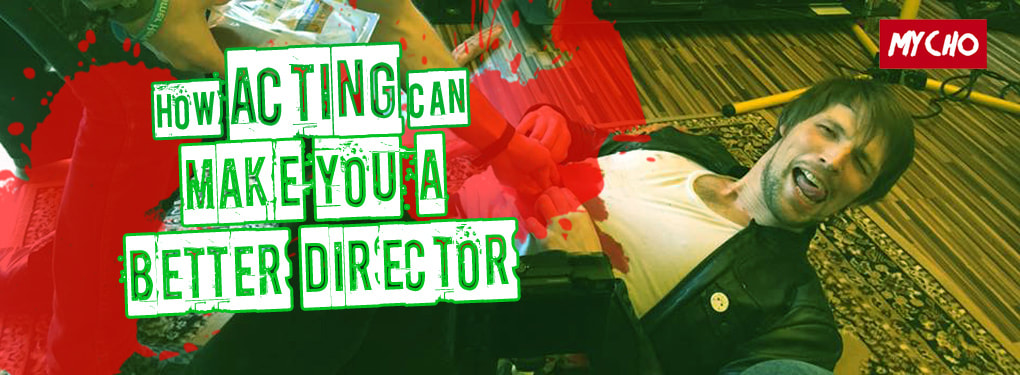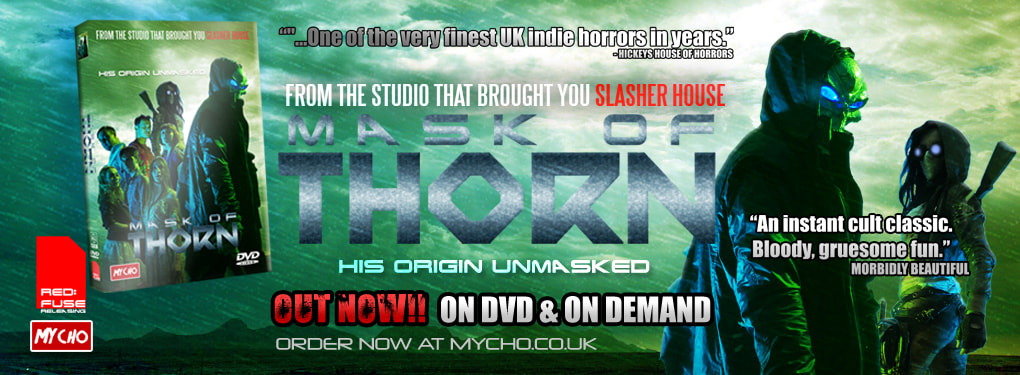Back in the days of VHS and late night horror on TV, when I was about 15 years old, one of the rare pleasures I had was staying over at my friends house, who had Cable TV and access to a whole host of rarities that would never, ever air on the 4/5 terrestrial channels most of us in the UK had. On one of these nights we watched a film that I had no idea what it was, a slasher horror set in supermarket that was fairly interesting and fun, yet the main thing that baffled me about it and made it stick in my mind was that one of the actors in it was 'Sam Raimi' the DIRECTOR of Evil Dead.
The film I later discovered went by several names, which made actually finding it again pretty tough. I eventually found it under the title Intruder (although it did go by Night Crew : The Final Checkout in the US for a while) and was always confused about why Raimi had turned up, outside of that his actors profile was pretty sparse (mainly reduced to cameos) and it just always stood out to me as odd. Years later the Evil Dead Trilogy finally came to DVD and on it was a very entertaining tit bit of information about 'The Intruder' via its special features. Raimi talked about how he wanted to get more experience as a Director by being on the other side of the camera to put himself in his actors shoes.
It was something that, to me at least, made perfect sense. What better way to understand what it was like to be an actor than to be an actor? I had done some acting for other peoples projects when I was young, simply because I was there and available and, most importantly... Free! Because of this, I knew that it would fairly easy for me to gain some more experience as an actor simply due to the fact that I work around other filmmakers all the time and as a result I ended up with, what I call, an 'Accidental Actors Resume' in order to gain more of an insight into what actors go through on set.
Here are the 3 things that I learned whilst acting in other peoples movies and how they helped me grow as a Director.
The film I later discovered went by several names, which made actually finding it again pretty tough. I eventually found it under the title Intruder (although it did go by Night Crew : The Final Checkout in the US for a while) and was always confused about why Raimi had turned up, outside of that his actors profile was pretty sparse (mainly reduced to cameos) and it just always stood out to me as odd. Years later the Evil Dead Trilogy finally came to DVD and on it was a very entertaining tit bit of information about 'The Intruder' via its special features. Raimi talked about how he wanted to get more experience as a Director by being on the other side of the camera to put himself in his actors shoes.
It was something that, to me at least, made perfect sense. What better way to understand what it was like to be an actor than to be an actor? I had done some acting for other peoples projects when I was young, simply because I was there and available and, most importantly... Free! Because of this, I knew that it would fairly easy for me to gain some more experience as an actor simply due to the fact that I work around other filmmakers all the time and as a result I ended up with, what I call, an 'Accidental Actors Resume' in order to gain more of an insight into what actors go through on set.
Here are the 3 things that I learned whilst acting in other peoples movies and how they helped me grow as a Director.
1. ACTING IS THE MOST FUN YOU CAN HAVE ON A FILM SET
My love has always been for Directing (or more accurately filmmaking), but that and most other production jobs come with a bucket load of stress. The one job that I always find breaks this rule is being an actor, now thats not to say it doesn't come with its own responsibilities, like Learning lines, hitting marks and, sometimes portraying extreme emotions, as well as it being physically taxing at times. All that aside though, its a good time, in reality you're playing pretend and its great fun to interact with other performers and if you get a really juicy role it can be the most fun you can have without taking your clothes off, unless thats required for the part of course.
On Legacy of Thorn, we had to grab some reshoots and inserts, our stunt performer wasn't available and I got to spend the evening running around as Thorn, due mainly to me being the only crew member there that was over 6ft. It was the most fun I had over the entire shoot, which was a fairly good experience to begin with, but it really was so good and cathartic just to run around dressed as a masked maniac for the afternoon. This really led to me not worrying about my actors when we were on set so much. Every so often I would get people who would complain, but for the most part actors are having a great time and so I learned just to let them get on with that. If people are happy and having a great time they'll give you a much better performance and create a much better atmosphere on set.
On Legacy of Thorn, we had to grab some reshoots and inserts, our stunt performer wasn't available and I got to spend the evening running around as Thorn, due mainly to me being the only crew member there that was over 6ft. It was the most fun I had over the entire shoot, which was a fairly good experience to begin with, but it really was so good and cathartic just to run around dressed as a masked maniac for the afternoon. This really led to me not worrying about my actors when we were on set so much. Every so often I would get people who would complain, but for the most part actors are having a great time and so I learned just to let them get on with that. If people are happy and having a great time they'll give you a much better performance and create a much better atmosphere on set.
2. HOW MUCH INFORMATION YOU GET INFLUENCES YOUR PERFORMANCE
This seems fairly obvious, the more information you have about your character and how your director wants you to approach that character the better. This isn't always how it works out though. A few years ago I would cast an actor in a role and then begin to talk about things like character and watch their eyes go vacant, all they really wanted was to go home, pop the credit on their IMDB and move on to the next thing. Of course, I took this for a long while to mean that actors didn't really care about anything that wasn't laid out in black and white on the pages of the script. In actual fact, good actors DO care and if there isn't enough information available they fill in the blanks themselves.
A few years ago I worked on a short film called 'Liam Is...' as an actor, the director gave me a huge insight into my character, his life, his backstory his relationship to the other characters and we worked on how he would be portrayed. Up until this point, I had mostly walked onto a set, said lines and been killed or chased or attacked or whatever and then gone home, hoping I'd done a good job. With Liam Is... however all that information was amazing to have and for the 3 or 4 days I was on set, I found it amazingly easy to slip into that character whenever the cameras started rolling because I had a sense of his past as well as his presence and for the first time I really understood the discipline of being an actor.
Now I make the effort to talk about our characters in as much depth as possible, even the small ones in order to try and make them more rounded. Of course, I still often get the glazed over look from some performers, but for the ones who listen it makes all the difference.
A few years ago I worked on a short film called 'Liam Is...' as an actor, the director gave me a huge insight into my character, his life, his backstory his relationship to the other characters and we worked on how he would be portrayed. Up until this point, I had mostly walked onto a set, said lines and been killed or chased or attacked or whatever and then gone home, hoping I'd done a good job. With Liam Is... however all that information was amazing to have and for the 3 or 4 days I was on set, I found it amazingly easy to slip into that character whenever the cameras started rolling because I had a sense of his past as well as his presence and for the first time I really understood the discipline of being an actor.
Now I make the effort to talk about our characters in as much depth as possible, even the small ones in order to try and make them more rounded. Of course, I still often get the glazed over look from some performers, but for the ones who listen it makes all the difference.
3. YOU SHOULD BE AS LITTLE OF A PROBLEM AS POSSIBLE
This one works backwards from my other points, but being a director and producer on low budget stuff, I was fully aware of how much constant questioning can become a problem. Some actors want to know everything, or just want to create problems for you. From things like "I can't get there for the call time" after they cleared it with you 3 days ago to "I have to work today sorry" after you've covered everyone else's expenses and paid for locations and catering, and these are just a couple of the most common ones. Some actors just want to create more problems and that just adds pressure to the already impossible task of making a movie on next to nothing.
When someone asks me to play a role, I take this on board, fully aware of the stress that it causes myself and my producer Anna, and I work on making myself as flexible as possible. I read the script, learn my lines, check if I need to bring anything (Costume, food for specific dietary requirements), find out what time I need to be there and then apart from that, I simply make contact the day before to confirm the time. That's it. To my shock and amazement, I've found that filmmakers actually like it when people don't cause them extra problems.
I recently work on a short film called 'Night-Man 3' and the director Kieron Johnston contacted me about a week before shooting to ask if I would take a role in it, he'd had an actor drop out and I was fairly local. He was having problems getting in touch with his actors and I could sense that it was a little stressful for him. Of course, the last thing I wanted to do was add more stress to his plate. So I asked him when we were shooting, what I needed to bring and left it at that until the following week, when I checked in to make sure the times were still correct (things like that shift fairly often) and up until I arrived I got the feeling that no one was sure if I'd actually turn up as I had been so relaxed about the whole thing. If you knew me, you'd know I'm on the least relaxed people on earth, so if I didn't make it an issue its not that tough, trust me.
Once there, I also tried to make myself as useful as possible on set in between takes and that went a long way to making the day, way more fun and helped us get done quicker. Going that extra mile aways helps.
When someone asks me to play a role, I take this on board, fully aware of the stress that it causes myself and my producer Anna, and I work on making myself as flexible as possible. I read the script, learn my lines, check if I need to bring anything (Costume, food for specific dietary requirements), find out what time I need to be there and then apart from that, I simply make contact the day before to confirm the time. That's it. To my shock and amazement, I've found that filmmakers actually like it when people don't cause them extra problems.
I recently work on a short film called 'Night-Man 3' and the director Kieron Johnston contacted me about a week before shooting to ask if I would take a role in it, he'd had an actor drop out and I was fairly local. He was having problems getting in touch with his actors and I could sense that it was a little stressful for him. Of course, the last thing I wanted to do was add more stress to his plate. So I asked him when we were shooting, what I needed to bring and left it at that until the following week, when I checked in to make sure the times were still correct (things like that shift fairly often) and up until I arrived I got the feeling that no one was sure if I'd actually turn up as I had been so relaxed about the whole thing. If you knew me, you'd know I'm on the least relaxed people on earth, so if I didn't make it an issue its not that tough, trust me.
Once there, I also tried to make myself as useful as possible on set in between takes and that went a long way to making the day, way more fun and helped us get done quicker. Going that extra mile aways helps.
Overall its good to stand in someones shoes, it helps you understand them and their craft and as a filmmaker, standing in the actors spot helps you realise what its like to be them and what kind of information you need to be fed so you can apply that to your craft. Not only that, but acting is fun, at least until you have to watch it back and you realise you suck.
MJ
IF YOU FIND THIS BLOG USEFUL. PLEASE SHARE. You can keep up to date with our filming goings on at our FACEBOOK PAGE :)
MJ
IF YOU FIND THIS BLOG USEFUL. PLEASE SHARE. You can keep up to date with our filming goings on at our FACEBOOK PAGE :)




 RSS Feed
RSS Feed
